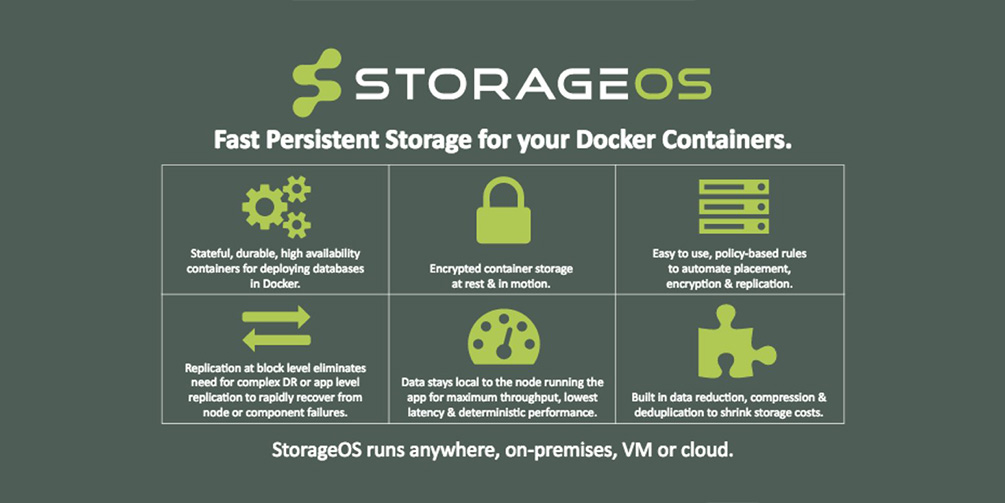Founded in 2013 StorageOS was created to resolve the frustration caused by many of the traditional storage market’s challenges. StorageOS allows developers, DevOps and WinOps teams to build enterprise-ready, persistent, highly-available, scalable container based applications by giving them total control of their own storage environment – whether on a customer’s server, a virtual machine or a cloud instance in any combination.
Below is our interview with Chris Brandon, CEO and co-founder of StorageOS:

Q: Chris, what are main advantages of using StorageOS?
A: The industry adoption of containers has been faster than anyone anticipated, which underscores the need for simple-to-use, cost-effective storage that is highly portable across physical, virtual and cloud devices. StorageOS delivers persistent storage for containers, delivering scalable, deterministic, low latency storage performance and simplifying provisioning and management of container based apps; all while enabling secure data mobility for containers between bare metal, virtual machines or cloud storage.
 Recommended: Thought Industries Has Built The World’s First Learning Business Platform
Recommended: Thought Industries Has Built The World’s First Learning Business Platform
Q: Where did the concept of StorageOS begin?
A: In the last few years, as containers gained popularity among all sizes of enterprises and global brands such as Netflix and the FT, we saw there were challenges for enterprise and production deployments. First, containers were designed to be stateless – they do not natively support requirements for databases, application state and instrumentation data. Also, traditional storage architectures are complex and lack API functionality to support DevOps; the storage doesn’t scale with apps; and performance is unpredictable. Additionally, it’s very difficult to move data securely between locations and/or cloud providers; management and performance tool sets are lacking. Finally, the cost model is geared towards fork lift CAPEX spikes and complex refresh cycles. We realized there was a prime opportunity to start a storage company that addresses these issues.
Q: Can you give us more insights into your features?
A: StorageOS utilizes policy-based rules to automate volume placement, replication and encryption of cloud data storage at rest and in motion. Also, replication at the block level ensures rapid recovery from node or disk failures and eliminates the need for complex disaster recovery solutions or app level replication. With StorageOS, data stays local to the node running an app for maximum throughput, low latency and deterministic performance, while built-in data reduction, compression and de-duplication reduces storage costs.
 Recommended: Edusson’s Machine Learning Technology Gives You Personalized Essay Writing Suggestions
Recommended: Edusson’s Machine Learning Technology Gives You Personalized Essay Writing Suggestions
Q: What are your plans? Do you have any new features in the pipeline?
A: We just released our beta product at DockerCon and we’ll be launching the GA this fall, so we’re focused on the core StorageOS product for the foreseeable future. As containers and other IT infrastructures continue to evolve, we’ll adapt and expand our solution accordingly to ensure storage remains simple, scalable and affordable for our customers.
Q: How would you convince the reader to start using StorageOS?
A: With our free download, readers can experience for themselves how StorageOS simplifies the provisioning and management of containerized storage. DevOps specialists and quality assurance managers can quickly test the container on a laptop or a public cloud, such as Amazon Web Services (AWS), in less than 15 minutes and without having to submit a third-party request.
 Recommended: Innovative BioTEch Firm VIRUN Aims To Truly Make The Impossible Possible
Recommended: Innovative BioTEch Firm VIRUN Aims To Truly Make The Impossible Possible
The solution’s ultra-low acquisition cost and pay-as-you-grow licensing help reduce overall costs and speed production time to market. Application containers and data services run together on the same node, delivering the fastest possible performance. As StorageOS can run on bare metal, virtual machines, native container environment and in the cloud, customers can avoid cloud provider lock-in, rapidly implement scale-out production storage and facilitate secure cloud migration.
Activate Social Media:


